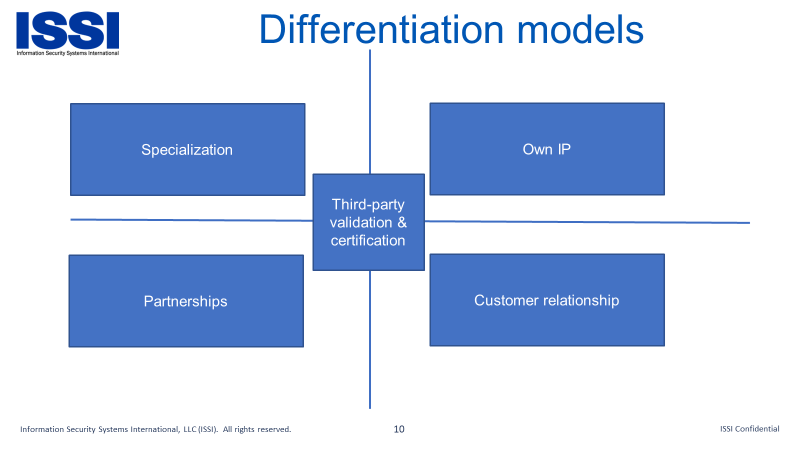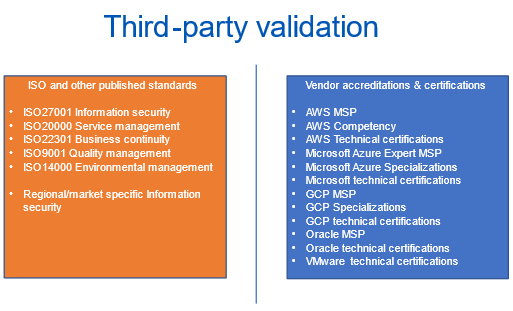How to differentiate your cloud MSP and cloud services company
Barry Turner
ISSI Head of Global Marketing & Senior Consultant

Why Differentiate?
The cloud consultancy services and managed service provider (MSP) markets become more crowded each year with new entrants and new services from existing cloud partners. This drive for market share is fueled by the growth in the use of public cloud, which is widely forecast to continue growing at a compound rate of 13%+ for the next four years. There has been significant growth in the number of channel partners of the hyperscale vendors AWS, GCP, Microsoft & Oracle. All of which are providing consultancy & managed services. This has resulted in the companies looking to use these services being faced with an array of choices, many of which look very similar. The question of how to differentiate becomes more urgent each year. Adding to this complex mix is the ever-increasing customer expectations, which evolve as the customer's cloud maturity develops with experience.
When companies successfully invest in differentiation the benefit is demonstrated in the financial results with significantly higher margins and higher levels of customer satisfaction.
How Strategy Helps
Differentiation starts with a clear strategy defining how to develop your MSP business over the next three to five years. When this foundation is missing, explaining to your customers why they should prefer your services rather than the competition becomes ever more difficult and often ends up with a discussion on price.
Differentiation Models Relevant To The Cloud MSP
In working with cloud MSPs and consultancy customers across the globe ISSI has identified five differentiation models that work for partners. These are shown in the diagram below:

Specialization, Market Vs. Technology
Market specialization is typically where the cloud partner focuses on a small number of vertical markets such as finance, the public sector, or manufacturing. The second market specialization is where a horizontal market is chosen such as small and medium businesses (SMB). In both cases making these choices enables the partner to differentiate the company by packaging services specific to the market and investing in market-specific employee expertise. One example of service packaging is providing defined scope & fixed-price professional services to the SMB market. This encourages smaller companies with limited budgets and low cloud skill levels to invest in what is perceived as a lower-risk and lower-cost option. Where the chosen strategy is to focus on a specific vertical market e.g. the public sector, investing in employees is critical. Ensuring that staff can operate successfully within the public sector culture, operate the procurement processes, and demonstrate that they understand the customer's requirements and concerns will go a long way to setting the company apart from the competition.
Technology specialization is where the company focuses on one or a small number of specific technologies. Typically this takes the form of a specific application vendor such as SAP, Oracle, or Microsoft Dynamics within the ERP market. Alternatively, the focus can be on a generic technology such as data analytics. This method of specialization is typically the result of investment in processes and skills in a technology where additional expertise over and above the standard cloud architecture and operation competencies is required. ISSI has a customer that focuses exclusively on data analytics, primarily for three vertical markets where this is perceived as critical to success. This clear strategic focus has resulted in well-above-market growth over many years.
Developing intellectual property (IP) usually takes the form of process automation, software development, and productizing solutions. Data released by Microsoft in 2023 indicates that partners that invest in developing IP generate margins that can be up to 20% to 30% higher than for professional and managed services. The examples seen in the market include managed service operation automation enabling service provision with a reduced headcount, and improving service quality by reducing errors. An example of service productization is a cloud MSP that provides users of mainframe computing models with a cloud migration methodology and a monthly subscription commercial model.
Partnerships
Partnerships usually take one of two forms either working with a company that has complimentary skill sets or including third-party technologies to provide a custom solution. The first method is used extensively by cloud MSPs to augment their capabilities two common examples are working with a specialist security provider and working with database specialists. This can often be used in the initial phase of providing a service to evaluate the market potential. One ISSI client used this model with security services and once the market viability was established the services were moved in-house. The second form of partnership is where complimentary vendors are used to enhance the cloud solution. Usually, this is either with specific technologies such as firewalls and networking or more process orientated such as a cloud management platform (CMP). Independent software vendors such as Morpheus Data market a CMP that enables a cloud MSP to develop a set of services specifically for their customers.
Customer Relationship
In his book "On Market Planning: understanding marketing plans and strategy" Malcolm Macdonald argues that the most effective long-term differentiation is derived from the customer relationship. A managed service relationship is very much a marriage, the two parties are interdependent on one another in a long-term relationship. This relationship has many parties involved across the two companies from the operational levels to the executive, providing the managed service provider with a unique opportunity to differentiate based on the depth and breadth of customer engagement. A key component in making this operational is the concept of Customer Success. According to Gainsight, a company that provides specialist Customer success software:
"Customer success is a business method that uses your product or service to help customers achieve their objectives. It's relationship-focused client management that aligns your customer with your company's goals—igniting beneficial outcomes for everyone involved."
Cloud consultancies and MSPs that invest in customer success typically benefit from increased customer retention, improved customer satisfaction, increased revenue opportunities, and improved brand image. To find out more about customer success please read the four blogs on developing a Customer Success practice on the ISSI website
Accreditation And Certification
The final method of differentiation is the use of vendor and third-party accreditations and certifications. Accreditations such as ISO 27001:2018 and the Microsoft Azure Expert MSP demonstrate to potential customers a deep level of process and organizational capability. This can also be extended to include employee certifications. Investing in and encouraging staff members to take certifications such as the AWS Solutions Architect demonstrates to prospective customers that the appropriate skills are available. Several ISSI customers use accreditations and certifications to differentiate, one example holds five ISO and many vendor accreditations to demonstrate a high level of competency to the target verticals. The most commonly sought accreditations are shown in the diagram below:

Summary
Differentiating your company in an increasingly competitive market is usually an iterative process that develops over several phases as the company's strategy evolves and matures with time. The starting point is often the ad hoc development of a specific service or capability in response to a customer requirement. What sets aside the companies that maximize the opportunity this creates is strategy development. To find out how ISSI can help you with this process please visit the service catalog here.
Barry Turner is ISSI's Head of Global Marketing & Senior Consultant. He has 25 years of service creation experience working with telecommunication and cloud service providers across EMEA on behalf of ISSI, Microsoft, Cisco, Mitel & Agile Programmes. He currently holds ITIL V4 Foundation, and ISO27001:2013 lead auditor certifications and is PMP certified.
References
| Sherweb.com | How to identify key competitive differentiators for your MSP business | https://www.sherweb.com/blog/partner/identify-key-competitive-differentiators/ |
| Microsoft | Differentiate to stand out | https://download.microsoft.com/download/4/8/5/485F15ED-D21B-42C8-84BD-A20FC572D4DF/Modern-Partner-Series-Part-2-Differentiate-to-stand-out.pdf |
| Malcolm MacDonald | On Marketing Planning | https://www.amazon.co.uk/Malcolm-McDonald-Marketing-Planning-Understanding/dp/0749451491 |
| CloudBlue | How to differentiate your MSP business | https://www.cloudbluepsa.com/blog/2017/07/differentiate-msp-business.html |
| Strategyzer | The value proposition canvas | https://www.strategyzer.com/canvas/value-proposition-canvas |
Additional Articles
Configuration Management Databases: Adding value for partners and their customers
Barry Turner, Senior Consultant, ISSIThe key to implementing an effective CMDB is having accurate information. In the rapidly changing cloud world, information on every configuration item must be automatically and frequently updated. This can be done in real time, although it is more commonly done once a day, either overnight or in a low-demand period.
You need to assess your customer success practice readiness. Here is why & how.
Jonathan Lee, ISSI Customer Success Practice LeadYou need to assess your Customer Success practice readiness. Here is why & how. By Jonathan Lee – ISSI Customer Success Practice Lead Customer Success
Microsoft's AI Cloud Partner Program: A New Way to Empower Partners
Pablo Marrone, ISSI Senior ConsultantThese start with the most basic - Membership - which is open to all channel partners. From there they progress through partner success; the attainment of “designations” based on partner capability scores; and finally, “specializations” that
- 03 APR 2025
Harnessing AI: Transforming Cloud Management for Managed Service Providers
Amarnath Gutta, Senior Consultant, ISSICloud infrastructure management involves provisioning resources, scaling based on demand, and performing routine maintenance tasks. AI-powered automation takes over these repetitive and time-consuming tasks, ensuring the cloud infrastructure is optimized without constant human intervention.
28 NOV 2023Meeting higher customer expectations in the cloud era
Pablo Marrone, Senior Consultant, ISSIMeeting Higher Customer Expectations in the Cloud Era By Pablo Marrone, Senior Consultant, ISSI The cloud computing industry has seen enormous changes in the past
05 DEC 2022You need to assess your customer success practice readiness. Here is why & how.
Jonathan Lee, ISSI Customer Success Practice LeadYou need to assess your Customer Success practice readiness. Here is why & how. By Jonathan Lee – ISSI Customer Success Practice Lead Customer Success
